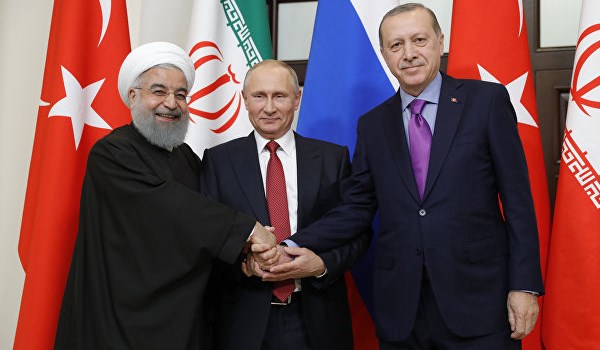
RNA - The three nations have met in the past on trying to get a peace process going in Syria, but right now the big issue on all their minds is increasing hostility from the US. However, the acrimony with the US is a major unifier for them, with countering the US agenda in Syria a top priority for all:
1- The three nations have agreed to continue their support for Syria’s efforts fighting against various terrorist groups and separatists. They also agree there is no military solution to the conflict and call on all parties to take part in the Istanbul summit.
2- The three nations agree that there can be no outside pressure to determine the political future of post-ISIL Syria.
Syrian President Bashar Assad and his government are committed to the peace process, in line with a UN Security Council resolution, that implies "constitutional reform and free and fair elections" in which all Syrians can participate.
3- The three nations have confirmed their support for de-escalation zones, including one in the southwest. They have also called on UN member states to increase humanitarian aid contributions for Syria. Quite the contrary, the US has run a major bombing campaign in Syria since 2011, when it stepped in to support terror proxies’ fight against the Syrian government - most of them ISIL and Qaeda allies - all at the expense of millions of innocent civilians. The US is merely pretending to fight ISIL and is hindering the allied forces’ offensive in eastern Syria.
4- The three nations have affirmed their commitment to Syria’s sovereignty, unity, independence, territorial integrity, and non-sectarian character. It was the allied forces of Iran, Syria, Russia and Hezbollah who sacrificed their lives to push armed groups and terror proxies from their main strongholds in recent months. True, the US-backed Kurdish and Arab proxies are in control of some parts of the country, but that’s not in the best interests of Syria’s territorial integrity. They are there to get political concessions from Damascus and justify US military occupation of Syria permanently.
5- The military presence of Iran and Russia in Syria is legitimate and based on the invitation of Damascus. Undoubtedly unwelcome by Syrians in any event, US forces must leave the country. Despite proclamations to the contrary, they are there without the permission of the Syrian government. The global community is firmly against the continuation of the US military occupation of Syria, by virtue of its long regime change agenda, its alliance with various terrorist groups and separatists, and its illegal airstrikes against civilian objects.
6- In a perfect world, the US is in Syria for freedom and democracy. But this is not the world we live in. It should now be apparent to all that regime change and disintegration of Syria is what the US and its proxies are after. This is not encouraging. As much as the US would like to believe that everyone in the world prefers Western-style democracy in Syria, that is not in fact the case either. The West should be very careful what it wishes for in Syria, because it is unlikely to get what it wants.
7- The leadership of Iran, Russia and Turkey see that end is in sight in Syria. That’s why they are attending the peace summit in Istanbul, which seeks to end the war. That’s also why the Syrian government is part of the peace process. The talks are to make substantive progress, and everyone knows it. Not only because of the wide international support, but because the process itself is deeply favoured by all Syrians and better reflects reality on the ground.
At any rate, we know from experience how difficult it will be to find a comprehensive solution. There is no silver bullet, and abandoning the summit carries its own risks. Before some parties dive into something new, it will be critical both to rigorously test assumptions and ensure that key allies and partners would offer diplomatic support. Those discussions will take time and should begin now.
The process, however, serves Syria’s interests and could even cut the timeline for new humanitarian commitments on the ground. It would also shift the discussion from war to politics, and potentially set into motion a process that could begin healing the rifts from Syria’s terrible war. The United States could decide to keep up the charade in Geneva, but if they want to see greater stability in their own country in the years ahead, they need to change course and get out of Syria.
Source: Fars News Agancy
847/940